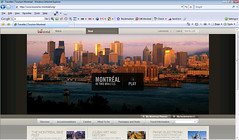

Archived 2005-2010


Top 5 not so popular posts (but still good reads, I think):
Thanks for reading! Stay tuned!

When will we see a browser that gives users a solid and secure framework in which we can create, design, and interact with the web in ways that we define and tailor to our needs?In the end, I concluded that it was not a matter of when a new browser with such features would appear, but rather who. Who would deliver the next generation web browser.
From Read Write Web (yet again - RWW is starting to become my new thought-provoking blog of choice), a presentation called "Web Technology Trends for 2008 and Beyond."

When the news surfaced last week about Microsoft's massive $42 billion bid for Yahoo!, I was not completely taken by surprise. Call me psychic, but the night before the takeover bid was announced, I was thinking: "Whatever happened to that Microsoft/Yahoo! merger?"
I am serious. I did think that.
Well, overall, I have mixed feelings about the whole thing. Being both a long time Microsoft user and Yahoo! user (heck, I can recall sitting in the Concordia University's then rudimentary computer lab, plugging away at a Lynx browser, finding something called Yahoo!), I believe the 'joining of forces' would benefit both companies.
1. Yahoo! is a very popular website. Very popular. Its brand conjures up very little public negativity. But as of late, the company has floundered. It is innovative but lack s direction, spreading itself to thin in all areas (hence that infamous Peanut Butter memo to Yahoo! employees). Worse, it cannot seem to monetize on its massive traffic and content.
2. Enter Microsoft. The company is cunning and possess the killer instincts that could revitalize Yahoo's sense of direction. Moreover, Microsoft has admitted, mainly indirectly, that it has failed to capture the online world--search, advertising--like its rival Google. Acquiring Yahoo! would certainly position Microsoft in a better place than it is now.
Will this merger really challenge Google's dominance?
The other night I wanted to embed a Google Map on a website. I read about fancy APIs and other third-party services, but all I wanted was something simple and straightforward. I visited the Google Maps website and clicked a few links until I found an embed script, which I had not seen before. A new service, I thought. Wow!! It's as though Google read my mind, knew what I wanted.
Maybe Google is psychic. Maybe that is why Google is number one.
If I shared with you my daily work activities, I would probably lose my readership (yes, all two of you), so I will not.
If your daily work activities are similar to mine, or if you're lucky enough that they resemble David Lee King's, let me know either way.
